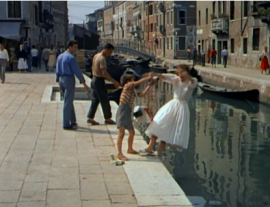
Good-bye, camera; hello, life.
The most famous moment in Summertime is, of course, when spinster Jane Hudson falls into the canal at Campo San Barnaba. It’s a surprising bit of slapstick in a romantic drama, but it serves its purpose beautifully: a wet and wild shock to Jane’s system that foreshadows her plunge into a life that includes physical excitement. The fact that Jane gamely climbs out of the canal with self- deprecating humor (“You should have seen me in the Olympics”) is also a signal: this is no easily embarrassed prude, it’s a mature woman fully ready to take that plunge. Before the immersion, Jane is captivated by Venice, but she’s an observer, experiencing it through guidebooks, her 8mm camera, excursions with a local urchin, and talks with her pensione proprietor, a voluptuary played by Isa Miranda. Although well into middle-age, Jane presents as a virgin. Not that she’s priggish; just inexperienced and stiffly conventional.
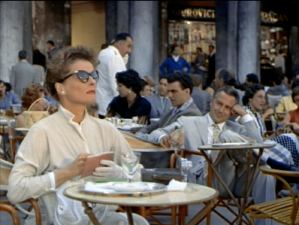
Keeping life at bay
The role gained Hepburn one of her 12 Oscar nominations. Her leading man, Rossano Brazzi, is so soulful and seductive as the philanderer that we’re never quite sure if he’s a cad or if he really does fall in love with Jane to some extent. (A question Europeans may not care about as much.) But I contend that the real costar, for better or worse, is Venice. David Lean won the New York Film Critics Circle award for directing this, and no wonder. One of his wise choices was to film more than 90 percent of the movie there. He immerses us in the city right along with Jane. Views of Venice are everywhere, which is a particular feast for those of us who didn’t see it before the armies of tourists displaced native Venetians (a situation which this film helped cause, according to Robert Osborne).
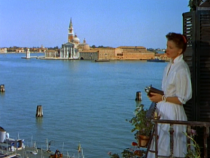
Juliet without Romeo
The film works, and memorably, but I do have regrets, minor though they are. I couldn’t quite understand Brazzi’s attraction to an uptight spinster, and her attraction to him seems merely generic— an American woman of a certain age and any elegant European gentleman. Hepburn’s character was more fully developed than Brazzi’s, but both could have used greater depth. That said, however, I appreciate that Summertime acknowledges the fact that brief encounters with travelers are usually sketchy— often gloriously so. It’s part of the seduction of travel. You only need present what you want to about your life back home. (Although of course, there’s no changing your character. That takes more than a passport.)
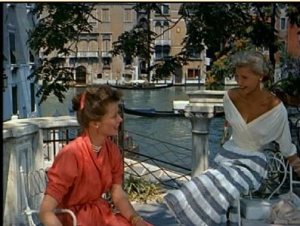
Hepburn and Miranda
Finally, and crucially, one of the great satisfactions of this film is that it is about love among adults, rather than among the insipid but photogenic twenty-something chick flicks that Hollywood dispenses like Snickers. In 1955, when this film was made, Hepburn was 48, Brazzi was 39, and Isa Miranda was 50. The youngsters were Darren McGavin, aged 33, and Mari Aldon, 29. Not a Megan in the bunch. Thank you yet again, David Lean.
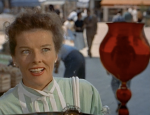
Too vital? and vintage?
My last regret, also minor, is one I will indulge at length because this is my blog and nobody can stop me. Admire Hepburn though I do, she may not have been the right actress to play a role that, in my view, should have been a less vital woman, and a slightly younger one. Hepburn is such a thoroughbred, and so indelibly herself on-screen, that it was a stretch for me to believe that she’d been wasting away in the spinster paddock all these years. I can’t help but wonder if the role shouldn’t have gone to someone else, and wonder at length, because it’s such fun. Question is, who?…




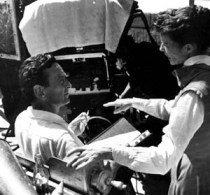






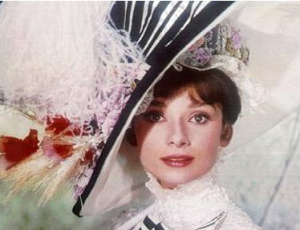


Adultery, with and without adults
Streep, Martin, Santa Barbara
Okay, this is going to be a long review. More than any movie I’ve seen lately, It’s Complicated struck me as a disturbing commentary on modern American society— all the more disturbing because the filmmaker seems utterly unaware of her most obvious message, a message that she shamelessly splashes across the screen: this movie celebrates a life of material wealth and moral poverty.
Streep’s Jane
I saw It’s Complicated for Meryl Streep. I had just rewatched Summertime, David Lean’s 1955 movie with a similar theme. So this was a chance to compare two venerable actresses in similar roles at similar points in their careers: Katharine Hepburn as a middle-aged spinster, Streep as a middle-aged divorcé— coincidentally or not, both named Jane. There’s a world of difference between a spinster and a divorcé, but both Janes are spirited career women who enter brief affairs. There’s also a world of difference between directors David Lean and Nancy Meyers. Lean’s films range from epic masterpieces like Lawrence of Arabia to small-scale masterpieces like Brief Encounter (which sets the standard for films about adultery). Meyers’s, in contrast, have no range whatsoever: she’s such a huckster for middle-aged American women that she’s become one of the reigning queens of that durable Hollywood genre, the chick flick.
Hepburn’s Jane
Hepburn, it turns out, outshines Streep, but only because Summertime is a vastly superior movie. (I confess, here, that I even don’t think Hepburn was the best choice for this aging-virgin role.) Summertime has an intelligent, literate script, the protagonist Jane is vulnerable but honorable, and the movie was entirely filmed in Venice (in fact, it was instrumental in the ultimate transition of Venice from city to tourist-infested museum piece). It’s Complicated, on the other hand, is a formulaic story set in Santa Barbara, which in this movie looks like it was built last year as a tribute to what money can buy.
With tub and tubby hubby
Money is almost a character in this film. It saturates every frame. “You’ve Feng-shui’d your life,” a friend says admiringly to Jane, whose house is unmitigated Martha Stewart or House and Garden or something: not one item suggests idiosyncratic or personal taste. The focus is on kitchens and bathrooms, the latter having been enthroned as an American fetish. The French have bedroom farces; It’s Complicated is an American bathroom farce. Bathrooms are used for dressing scenes, a private phone call scene, a marijuana scene, and at least one bath scene. Jane even uses a bathroom to describe her feelings: she has his and hers sinks, and the his sink makes her sad.
Now that I live alone, I need another wing.
But Jane is a professional baker, so her extravagance also shows up in lavish kitchens. She already has two, in her bakery and in her home (see top pic), yet she hires architect Adam (Steve Martin) to build her “dream kitchen” as part of a whole new wing for her empty nest. Seriously– the kids move out, she adds square footage. I kept waiting to hear what she planned to do with her existing elaborate kitchen, or at least hear her ask Adam to design something that could use her present state-of-the-art fixtures, but such practicality would have been a spoonful of reality in this wanton homage to consumerism… Continue reading →
Rate this:
Share this:
6 Comments
Posted in Chick flick, Film Commentary, Movies
Tagged Adultery, Alan Alda, Alec Baldwin, Bess Armstrong, California, Chick flick, Comedy, Consumerism, David Lean, Directors, Divorce, Family, Hollywood, It's Complicated, John Krasinski, Katharine Hepburn, Lake Bell, Marriage, Meryl Streep, Michael Caine, Mrs. Doubtfire, Nancy Meyers, Oscar, Rossano Brazzi, Santa Barbara, Steve Martin, Summertime, The Four Seasons (1981), Venice